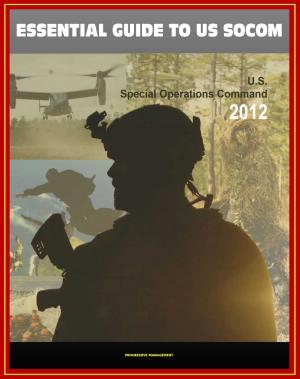Eisenhower: The Most Reasonable of Unreasonable Men: Eisenhower as Strategic General in World War II - Lifelong Student, Supreme Commander, Moral Leader, Extraordinary Personal Energy
Nonfiction, History, Military, Strategy, World War II| Author: | Progressive Management | ISBN: | 9781370872305 |
| Publisher: | Progressive Management | Publication: | March 16, 2017 |
| Imprint: | Smashwords Edition | Language: | English |
| Author: | Progressive Management |
| ISBN: | 9781370872305 |
| Publisher: | Progressive Management |
| Publication: | March 16, 2017 |
| Imprint: | Smashwords Edition |
| Language: | English |
This report has been professionally converted for accurate flowing-text e-book format reproduction. This paper investigates General Dwight D. Eisenhower's roles as strategist and strategic general during World War II. Eisenhower had zero combat experience and was still a colonel on the Army rolls when selected for four-star unified command. Yet, he fought and won the war in Europe on his own terms. He designed his own chain of command, drafted the terms for Allied cooperation and strategy, built the Allied command structure, disobeyed heads of state, engaged in military diplomacy with political enemies, and enforced his personal morality upon an entire theater of war. He was the field commander for four great campaigns including the first Allied effort m North Africa and the final drive from the English Channel to the Elbe. In his humble and disarming way, Eisenhower was the most unreasonable general of all time.
This study concludes that Eisenhower was an unconventional military thinker whose success as strategic general was due primarily to his capacity for progressive and creative vision. His extraordinary personal energy, initiative, creativity, and integrity enabled him to translate his unique vision into reality.
Eisenhower's role in World War II was truly unique. Never before had a military commander been asked to accomplish a task of such magnitude as the conquest of Western Europe with such disparate forces and with such little real authority. What is more, Eisenhower's prescribed endstate was not a negotiated peace, but the enemy's "unconditional surrender"—a term that served great rhetorical purposes, but was never defined in either military or political terms. No one prior to World War II had ever held joint command of ground, air, and naval forces. No American had ever directed the combined forces of allied nations. Contemporary coalition commands that were formed in the Pacific, Middle East, and Southwest Asia were much less complex. They were generally focused exclusively on either land or sea operations, and all were much smaller. Eisenhower's massive unified command of joint and multinational forces was unparalleled in the war by either the Allies or the Axis.
This report has been professionally converted for accurate flowing-text e-book format reproduction. This paper investigates General Dwight D. Eisenhower's roles as strategist and strategic general during World War II. Eisenhower had zero combat experience and was still a colonel on the Army rolls when selected for four-star unified command. Yet, he fought and won the war in Europe on his own terms. He designed his own chain of command, drafted the terms for Allied cooperation and strategy, built the Allied command structure, disobeyed heads of state, engaged in military diplomacy with political enemies, and enforced his personal morality upon an entire theater of war. He was the field commander for four great campaigns including the first Allied effort m North Africa and the final drive from the English Channel to the Elbe. In his humble and disarming way, Eisenhower was the most unreasonable general of all time.
This study concludes that Eisenhower was an unconventional military thinker whose success as strategic general was due primarily to his capacity for progressive and creative vision. His extraordinary personal energy, initiative, creativity, and integrity enabled him to translate his unique vision into reality.
Eisenhower's role in World War II was truly unique. Never before had a military commander been asked to accomplish a task of such magnitude as the conquest of Western Europe with such disparate forces and with such little real authority. What is more, Eisenhower's prescribed endstate was not a negotiated peace, but the enemy's "unconditional surrender"—a term that served great rhetorical purposes, but was never defined in either military or political terms. No one prior to World War II had ever held joint command of ground, air, and naval forces. No American had ever directed the combined forces of allied nations. Contemporary coalition commands that were formed in the Pacific, Middle East, and Southwest Asia were much less complex. They were generally focused exclusively on either land or sea operations, and all were much smaller. Eisenhower's massive unified command of joint and multinational forces was unparalleled in the war by either the Allies or the Axis.















